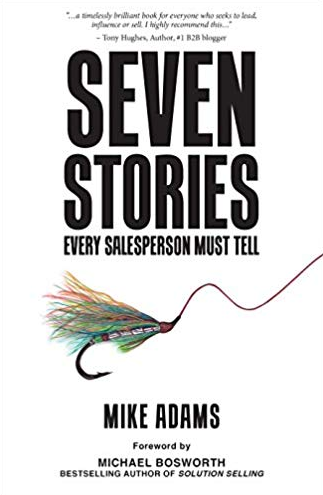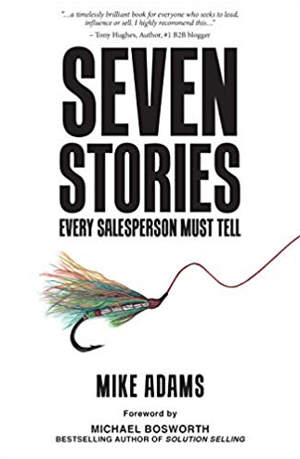The 7 storytelling secrets of successful salespeople
August 10, 2018

 I’ve long believed that top sellers are storytellers. They are able to call upon a rich fund of relevant anecdotes that they use to communicate and persuade far more convincingly than a conventional sales pitch could ever do. And in sharing their stories they encourage their customers to tell their own stories.
I’ve long believed that top sellers are storytellers. They are able to call upon a rich fund of relevant anecdotes that they use to communicate and persuade far more convincingly than a conventional sales pitch could ever do. And in sharing their stories they encourage their customers to tell their own stories.
As humans, we are wired for story, and have been since long before the days of Homer. Some of us are naturally gifted storytellers, and others have to work on developing this critical skill. But we can all learn to do it well if we have the right framework and are prepared to put in the effort.
But unlike product knowledge or presentation and questioning skills, storytelling skills have rarely been part of the sales training agenda. It’s a subject that has been woefully neglected. The sales profession has been crying out for a guide, and I believe we have finally found one in an outstanding new book from Mike Adams...
It’s never been more important for sales people to be able to rise above the clutter of cookie-cutter communications and really engage with their customers at both an emotional and a rational level. And it’s never been more important that we cut out all the buzz-word and jargon-ridden nonsense and adopt a more empathetic approach to customer conversations.
All we’ve been waiting for is a guide. And Mike’s new book “Seven Stories Every Sales Person Must Tell” is the most comprehensive handbook I’ve ever come across to enable sales people to both tell more effective stories and to stimulate our customers to share their own stories in return.
According to Mike’s analysis, successful stories incorporate a sequence of events that fit a known framework, are interesting and unpredictable, turn on one main character and make or illustrate a relevant business point. If any of these are missing, the story is unlikely to engage, persuade or convince.
Perhaps most important, the listener needs to be able to relate to the protagonist and see some important aspects of their own situation in the journey undertaken by the hero of the story. And if the story is to be realistic, it must include some believable complications along the way.
If there is no struggle, there is no story. I believe this is why so many overly-sanitised case studies that follow a simple problem-solution pattern without acknowledging any difficulties along the way simply lack credibility - and why you’ve got to question whether there was any value in publishing them.
As Mike points out, myths, movies and novels can have complex narrative structures of the sort described by Joseph Campbell in “The Hero with a Thousand Faces”, but at minimum the narrative arc of any good sales story must include four key elements:
- Setting: First off, our story needs a setting to establish context - typically including time and place markers that allow our audience to start painting a mental picture
- Complications: If we are to establish our credibility and engage our audience’s attention, our story needs to incorporate complications and some element of unpredictability
- Turning point: Although complications are necessary to establish interest and credibility when telling sales stories, we (mostly) want to end on a positive note, so the turning point provides the crucial pivot for the story
- Resolution: The journey ends with the complications being resolved, tension and suspense being lifted, and a valuable lesson conveyed to the listener
We can embellish or extend these elements. But if any of these four key elements is missing, our story is unlikely to engage or persuade, or be in any way memorable to the listener.
By the way, I also recommend that where possible you add a fifth and final element to Mike's formula: the unexpected benefit. Once you have revealed the resolution, the story can become even more emotionally engaging if you add something like "but in addition to resolving their initial problem, they found that an unexpected benefit was [insert surprising additional benefit]".
Who are the most effective story tellers in your own organisation? I’d expect many of your best-performing sales people and business consultants to be members of this group, but it would be unusual if the company founders weren’t also highly effective story tellers.
How can we learn from their experiences and establish a company-wide story telling competence - one that not only makes existing staff more effective, but also inducts every new employee into a culture of storytelling and shared experience?
Well, it requires that we establish an ever-growing pool of sharable stories and encourage and equip our customer-facing people to practice and continually develop their story telling skills.
Mike’s book provides an essential foundation for this endeavour, and I commend it to you. For a very limited promotional period, you can download the Kindle version from Amazon for only £0.99.
The offer closes on Monday 13th August - so I strongly suggest that you download your copy today.
Well, you're probably asking, what are the 7 Stories every sales person must tell? Well, for the full details I suggest you read the book, but here’s a taster:
- Your personal story
- Key staff stories
- Company creation story
- Insight stories
- Success stories
- Values stories
- Teaching stories
These story types differ in their choice of central character and their purpose. But Mike makes a compelling case for mastering every one of these story types - and provides detailed guidance on how to best develop and articulate each of them.
So - what’s your story? And how has story telling helped you succeed? Be sure to drop me a line or set up a call and tell me about your experiences - and I’d be happy to share my stories in return...
ABOUT THE AUTHOR
 Bob Apollo is a Fellow of the Association of Professional Sales, a regular contributor to the International Journal of Sales Transformation and the founder of UK-based Inflexion-Point Strategy Partners. Following a successful career spanning start-ups, scale-ups and corporates, Bob now works with high-potential tech-based B2B-focused scale-up businesses, equipping them to Sell in the Breakthrough Zone® by systematically creating, capturing and confirming their distinctive value in every customer interaction.
Bob Apollo is a Fellow of the Association of Professional Sales, a regular contributor to the International Journal of Sales Transformation and the founder of UK-based Inflexion-Point Strategy Partners. Following a successful career spanning start-ups, scale-ups and corporates, Bob now works with high-potential tech-based B2B-focused scale-up businesses, equipping them to Sell in the Breakthrough Zone® by systematically creating, capturing and confirming their distinctive value in every customer interaction.


Comments